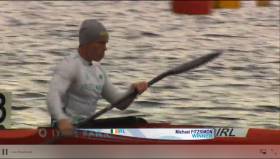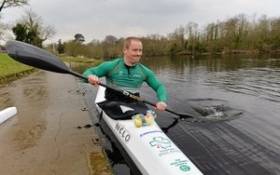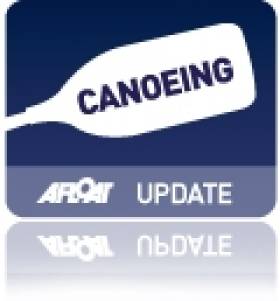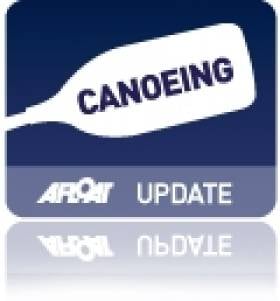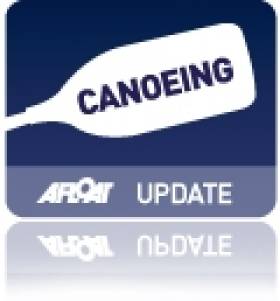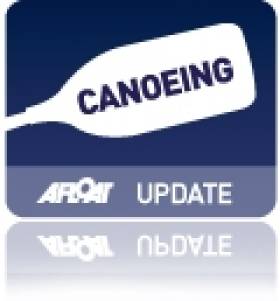Displaying items by tag: Canoe Sprint
Fitzsimon Wins Semi-Final at Olympic Qualifier
#Canoeing: Michael Fitzsimon won his semi-final of the men’s K1 1,000 metres to reach the A Final at the canoe sprint European Olympic Qualifier in Duisburg in Germany. The under-23 competitor can qualify for the Olympic Games if he finishes in the top two in the final.
Canoe Sprint European Olympic Qualifier, Duisburg, Germany (Selected Results, Irish interest)
Men
K1 1,000 – Heat One (Winner to A Final; 2-7 to semi-final; rest out): 4 M Fitzsimon 3:31.693. Semi-Final: 1 Fitzsimon 3:31.453.
K2 200 – Heat One (First Three to A Final; 4-7 to semi-final): 6 T Brennan, B Watkins 34.350. Semi-Final (First Three to A Final; rest out): 5 Brennan, Watkins 34.249.
Women
K1 500 – Heat One (Three to Final; 4-7 to Semi-Final): 5 J Egan 1:55.428. Semi-Final (Three to A Final): 3 Egan 1:52.823.
Paracanoe World Championships, Duisburg
Men - KL3 200- Heat Four (First Seven to Semi-Final): 2 P O’Leary 42.061. Semi-Final One (First Two and next best time to A Final; 3rd, 4th to B Final): 3 O’Leary 41.722.
O'Leary Pipped for World Championships A Final Place
#Canoeing: Patrick O’Leary set a new personal best for the second sucessive day, but just missed out on a place in the A Final at the Paracanoe World Championships in Duisburg in Germany this morning. The 43-year-old Irishman finished third in his semi-final of the KL3 200 metres. The top two from the semi-finals and the fastest third place finisher would go through – and O’Leary was pipped by less than seven tenths of a second by France’s Martin Farineaux for this place. Farineaux finished third in the fourth of the four semi-finals. O’Leary qualifies for the B Final.
In the canoe sprint European Olympic Qualifier, Ireland crews qualified for semi-finals through their heats. Michael Fitzsimon finished 4th in the K1 1,000, Jenny Egan fifth in the K1 500 and the K2 200 crew of Tom Brennan and Barry Watkins were sixth.
Paracanoe World Championships, Duisburg (Selected Results; Irish interest):
Men - KL3 200- Heat Four (First Seven to Semi-Final): 2 P O’Leary 42.061. Semi-Final One (First Two and next best time to A Final; 3rd, 4th to B Final): 3 O’Leary 41.722.
Canoe Sprint European Olympic Qualifier, Duisburg, Germany
Men
K1 1,000 – Heat One (Winner to A Final; 2-7 to semi-final; rest out): 4 M Fitzsimon 3:31.693.
K2 200 – Heat One (First Three to A Final; 4-7 to semi-final): 6 T Brennan, B Watkins 34.350.
Women
K1 500 – Heat One (Three to Final; 4-7 to Semi-Final): 5 J Egan 1:55.428.
Egan and Brennan Go Out at Semi-Final Stage in Duisburg
#CANOEING: Ireland’s Tom Brennan and Jenny Egan failed to make it through their semi-finals at the Canoe Sprint World Cup in Duisburg, Germany today. Egan finished eighth and Brennan ninth in their K1 200 races. Egan goes in the K1 5,000 metres on Sunday. and paracanoeist Pat O’Leary competes in the A Final of the KL3 200 metres.
Canoe Sprint World Cup, Duisburg, Germany (Irish interest)
Men,
K1 200m – Semi-Final Four: 9 T Brennan 38.361
Women
K1 200 – Semi-Final Two: 8 J Egan 44.124.
#CANOEING: Jenny Egan brought Ireland a first senior medal at the European Canoe Sprint Championships when she took bronze in the Women’s K1 5,000 metres in Racice in the Czech Republic today. Egan, from the Salmon Leap club in Leixlip, was part of a successful breakaway at 1,000 metres with Maryna Litvinchuk of Belarus, who took gold, and Irene Burgo of Italy, the silver medallist. Less than two-thirds of a second divided the three.
Ireland paracanoeist Patrick O’Leary finished fourth in his KL3 200 metre final. Robert Oliver of Britain took gold. O’Leary was just a third off a second of taking bronze.
European Canoe Sprint Championships, Racice, Czech Republic (Selected Results; Irish interest)
Saturday
Men
K2 200 – Heat Three (First Three to A Final; 4-7 to B Final; rest out): 1 Serbia 31.676; 8 P Egan, S Dobrovolskis 34.808.
C1 200 - Heat Three (Winner to Final; second to seventh to semi-final): 1 Portugal (H Silva) 39.236; 7 A Jezierski 43.220. Semi-Final: Jezierski did not start.
K1 200 – Heat Two: 6 T Brennan 37.596. Semi-Final (First Three to A Final, 4-7 to B Final): 1 Latvia (A Rumjancevs) 36.072; 7 T Brennan 37.852
Paracanoe KL3 – A Final: 1 Britain (R Oliver) 40.88; 4 P O’Leary 42.536.
Women
K1 200 – Heat Three (Winner to Final; second to seventh to semi-final): 1 Serbia (N Moldovan) 40.236; 7 J Egan 43.384. Semi-Final (First Three to A Final, 4-7 to B Final): 1 Russia (N Podolskaya) 42.196; 7 Egan 45.344.
Sunday
Men
K1 200 – B Final: 5 T Brennan (14th overall)
K1 5,000 – A Final: 18 P Egan 22:58.09.
Women
K1 5,000 – A Final: 1 Belarus (M Litvinchuk) 22 mins 19.25 seconds, 2 Italy (I Burgo) 22:19.68, 3 Ireland (J Egan) 22 mins 19.9 seconds.
K1 500 – B Final 6 J Egan 2:00.376. (15th overall)
K1 200 – B Final: 7 J Egan 44.896 (16th overall)
O'Leary Qualifies for Canoe Sprint World Final
#CANOEING: Ireland paracanoeist Pat O’Leary finished third in his semi-final and qualified for the final of the K1 LTA 200m at the Canoe Sprint World Championships in Moscow today. The legs, trunk and arms competitor was fifth in his heat. The top three in the semi-finals qualified for the finals.
Canoe Sprint World Championships (Day One, Irish interest)
Men
K1 (Legs, Trunk and Arms) Heat Two (First directly to Final; 2-7 to Semi-Final); 1 Romania 40.211 seconds; 5 P O’Leary 43.198. Semi-Final (First Three to A Final): 1 Britain 42.473; 3 O’Leary 43.538.
.
# EURO CANOE SPRINT: On his first outing at the European Canoe Sprint Championships in Portugal, Ireland’s Andrzej Jezierski finished second in his heat of the C1 200, just eight hundredths of a second off the top spot. Jezierski goes directly through to tomorrow's A Final.
Barry Watkins finished eighth in the A Final of the K1 1000.
European Canoe Sprint Championships (Irish interest)
Men
K1 1000 – A Final: 8 B Watkins 3:33.420.
C1 200 – Heat One: 2 A Jezierski 41.594
Women
K1 200 – Heat One: J Egan 47.429



























